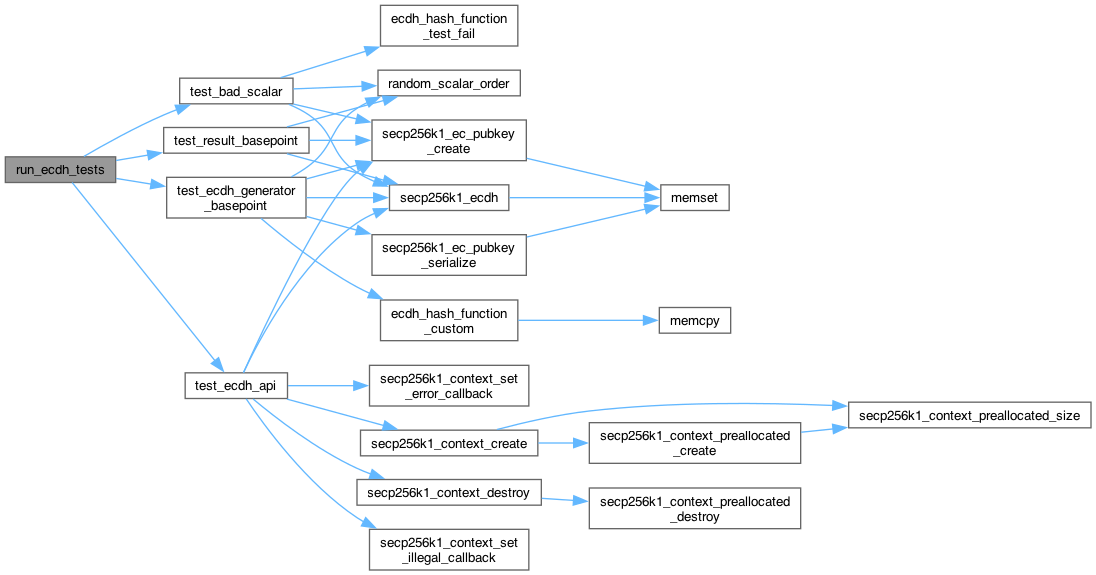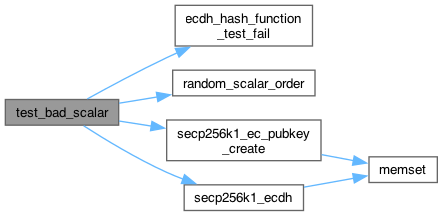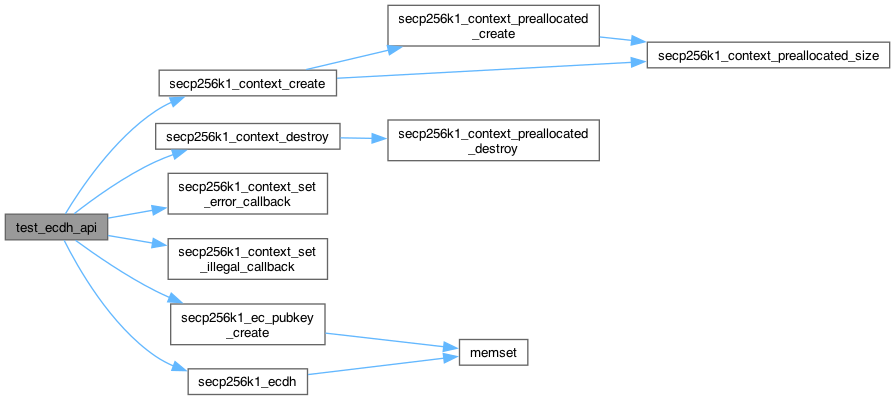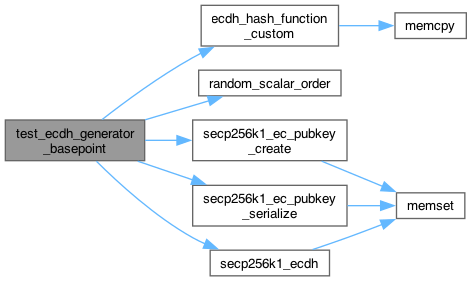Loading...
Searching...
No Matches
tests_impl.h File Reference
Go to the source code of this file.
Functions | |
| int | ecdh_hash_function_test_fail (unsigned char *output, const unsigned char *x, const unsigned char *y, void *data) |
| int | ecdh_hash_function_custom (unsigned char *output, const unsigned char *x, const unsigned char *y, void *data) |
| void | test_ecdh_api (void) |
| void | test_ecdh_generator_basepoint (void) |
| void | test_bad_scalar (void) |
| void | test_result_basepoint (void) |
| void | run_ecdh_tests (void) |
Function Documentation
◆ ecdh_hash_function_custom()
| int ecdh_hash_function_custom | ( | unsigned char * | output, |
| const unsigned char * | x, | ||
| const unsigned char * | y, | ||
| void * | data ) |
Definition at line 18 of file tests_impl.h.
18 {
19 (void)data;
20 /* Save x and y as uncompressed public key */
21 output[0] = 0x04;
22 memcpy(output + 1, x, 32);
23 memcpy(output + 33, y, 32);
24 return 1;
25}
memcpy((char *) pInfo->slotDescription, s, l)
Here is the call graph for this function:

Here is the caller graph for this function:

◆ ecdh_hash_function_test_fail()
| int ecdh_hash_function_test_fail | ( | unsigned char * | output, |
| const unsigned char * | x, | ||
| const unsigned char * | y, | ||
| void * | data ) |
Definition at line 10 of file tests_impl.h.
10 {
11 (void)output;
12 (void)x;
13 (void)y;
14 (void)data;
15 return 0;
16}
Here is the caller graph for this function:

◆ run_ecdh_tests()
| void run_ecdh_tests | ( | void | ) |
Definition at line 158 of file tests_impl.h.
Here is the call graph for this function:

Here is the caller graph for this function:

◆ test_bad_scalar()
| void test_bad_scalar | ( | void | ) |
Definition at line 97 of file tests_impl.h.
97 {
98 unsigned char s_zero[32] = { 0 };
99 unsigned char s_overflow[32] = {
100 0xff, 0xff, 0xff, 0xff, 0xff, 0xff, 0xff, 0xff,
101 0xff, 0xff, 0xff, 0xff, 0xff, 0xff, 0xff, 0xfe,
102 0xba, 0xae, 0xdc, 0xe6, 0xaf, 0x48, 0xa0, 0x3b,
103 0xbf, 0xd2, 0x5e, 0x8c, 0xd0, 0x36, 0x41, 0x41
104 };
105 unsigned char s_rand[32] = { 0 };
106 unsigned char output[32];
107 secp256k1_scalar rand;
109
110 /* Create random point */
111 random_scalar_order(&rand);
112 secp256k1_scalar_get_b32(s_rand, &rand);
114
115 /* Try to multiply it by bad values */
118 /* ...and a good one */
119 s_overflow[31] -= 1;
121
122 /* Hash function failure results in ecdh failure */
123 CHECK(secp256k1_ecdh(ctx, output, &point, s_overflow, ecdh_hash_function_test_fail, NULL) == 0);
124}
int ecdh_hash_function_test_fail(unsigned char *output, const unsigned char *x, const unsigned char *y, void *data)
Definition tests_impl.h:10
SECP256K1_API SECP256K1_WARN_UNUSED_RESULT int secp256k1_ec_pubkey_create(const secp256k1_context *ctx, secp256k1_pubkey *pubkey, const unsigned char *seckey) SECP256K1_ARG_NONNULL(1) SECP256K1_ARG_NONNULL(2) SECP256K1_ARG_NONNULL(3)
Definition secp256k1.c:551
SECP256K1_API SECP256K1_WARN_UNUSED_RESULT int secp256k1_ecdh(const secp256k1_context *ctx, unsigned char *output, const secp256k1_pubkey *pubkey, const unsigned char *seckey, secp256k1_ecdh_hash_function hashfp, void *data) SECP256K1_ARG_NONNULL(1) SECP256K1_ARG_NONNULL(2) SECP256K1_ARG_NONNULL(3) SECP256K1_ARG_NONNULL(4)
Definition main_impl.h:29
Definition Benchmark.cpp:5
Definition secp256k1.h:70
Definition scalar_4x64.h:13
Here is the call graph for this function:

Here is the caller graph for this function:

◆ test_ecdh_api()
| void test_ecdh_api | ( | void | ) |
Definition at line 27 of file tests_impl.h.
27 {
28 /* Setup context that just counts errors */
31 unsigned char res[32];
32 unsigned char s_one[32] = { 0 };
33 int32_t ecount = 0;
34 s_one[31] = 1;
35
36 secp256k1_context_set_error_callback(tctx, counting_illegal_callback_fn, &ecount);
37 secp256k1_context_set_illegal_callback(tctx, counting_illegal_callback_fn, &ecount);
39
40 /* Check all NULLs are detected */
42 CHECK(ecount == 0);
44 CHECK(ecount == 1);
46 CHECK(ecount == 2);
48 CHECK(ecount == 3);
50 CHECK(ecount == 3);
51
52 /* Cleanup */
53 secp256k1_context_destroy(tctx);
54}
SECP256K1_API void secp256k1_context_destroy(secp256k1_context *ctx) SECP256K1_ARG_NONNULL(1)
Definition secp256k1.c:146
SECP256K1_API void secp256k1_context_set_error_callback(secp256k1_context *ctx, void(*fun)(const char *message, void *data), const void *data) SECP256K1_ARG_NONNULL(1)
Definition secp256k1.c:162
SECP256K1_API secp256k1_context * secp256k1_context_create(unsigned int flags) SECP256K1_WARN_UNUSED_RESULT
Definition secp256k1.c:107
SECP256K1_API void secp256k1_context_set_illegal_callback(secp256k1_context *ctx, void(*fun)(const char *message, void *data), const void *data) SECP256K1_ARG_NONNULL(1)
Definition secp256k1.c:153
Definition secp256k1.c:47
Here is the call graph for this function:

Here is the caller graph for this function:

◆ test_ecdh_generator_basepoint()
| void test_ecdh_generator_basepoint | ( | void | ) |
Definition at line 56 of file tests_impl.h.
56 {
57 unsigned char s_one[32] = { 0 };
59 int i;
60
61 s_one[31] = 1;
62 /* Check against pubkey creation when the basepoint is the generator */
64 secp256k1_sha256 sha;
65 unsigned char s_b32[32];
66 unsigned char output_ecdh[65];
67 unsigned char output_ser[32];
68 unsigned char point_ser[65];
69 size_t point_ser_len = sizeof(point_ser);
71
73 secp256k1_scalar_get_b32(s_b32, &s);
74
77
78 /* compute using ECDH function with custom hash function */
80 /* compute "explicitly" */
81 CHECK(secp256k1_ec_pubkey_serialize(ctx, point_ser, &point_ser_len, &point[1], SECP256K1_EC_UNCOMPRESSED) == 1);
82 /* compare */
83 CHECK(secp256k1_memcmp_var(output_ecdh, point_ser, 65) == 0);
84
85 /* compute using ECDH function with default hash function */
87 /* compute "explicitly" */
88 CHECK(secp256k1_ec_pubkey_serialize(ctx, point_ser, &point_ser_len, &point[1], SECP256K1_EC_COMPRESSED) == 1);
89 secp256k1_sha256_initialize(&sha);
90 secp256k1_sha256_write(&sha, point_ser, point_ser_len);
91 secp256k1_sha256_finalize(&sha, output_ser);
92 /* compare */
93 CHECK(secp256k1_memcmp_var(output_ecdh, output_ser, 32) == 0);
94 }
95}
int ecdh_hash_function_custom(unsigned char *output, const unsigned char *x, const unsigned char *y, void *data)
Definition tests_impl.h:18
SECP256K1_API int secp256k1_ec_pubkey_serialize(const secp256k1_context *ctx, unsigned char *output, size_t *outputlen, const secp256k1_pubkey *pubkey, unsigned int flags) SECP256K1_ARG_NONNULL(1) SECP256K1_ARG_NONNULL(2) SECP256K1_ARG_NONNULL(3) SECP256K1_ARG_NONNULL(4)
Definition secp256k1.c:246
Definition hash.h:13
Here is the call graph for this function:

Here is the caller graph for this function:

◆ test_result_basepoint()
| void test_result_basepoint | ( | void | ) |
Test that ECDH(sG, 1/s) == ECDH((1/s)G, s) == ECDH(G, 1) for a few random s.
Definition at line 127 of file tests_impl.h.
127 {
129 secp256k1_scalar rand;
131 unsigned char s_inv[32];
132 unsigned char out[32];
133 unsigned char out_inv[32];
134 unsigned char out_base[32];
135 int i;
136
137 unsigned char s_one[32] = { 0 };
138 s_one[31] = 1;
141
143 random_scalar_order(&rand);
144 secp256k1_scalar_get_b32(s, &rand);
145 secp256k1_scalar_inverse(&rand, &rand);
146 secp256k1_scalar_get_b32(s_inv, &rand);
147
150 CHECK(secp256k1_memcmp_var(out, out_base, 32) == 0);
151
154 CHECK(secp256k1_memcmp_var(out_inv, out_base, 32) == 0);
155 }
156}
Here is the call graph for this function:

Here is the caller graph for this function:
